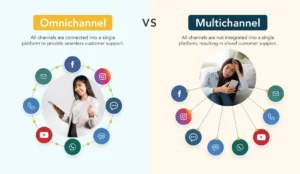Sustainable Business Practices: Your Blueprint for Success in the 21st Century!
Success means more than just making profits, at least not in today’s world. When talking about sustainability, you have to succeed while keeping a watchful eye on sustainability, ethics, and corporate responsibility. Sustainable business practices have become a guiding light in the modern age, which can guide your business the way forward to long-term success. Sustainability isn’t just a trendy buzzword; it’s a fundamental shift in how we do business growth strategy. We have to meet today’s needs without compromising the future. In this article, we’ll dive deep into the essential components of these practices and why they’re absolutely crucial for your success in the 21st Century.

1. Sustainability: A Must-Have Imperative
Sustainability isn’t just a passing fad. It’s a must-have in today’s business world. With global challenges like climate change, businesses that put sustainability at their core aren’t just doing the right thing; they’re setting themselves up for lasting success. Sustainability comes in various flavors, including taking care of the environment, building positive relationships in your community, and staying financially strong. On the other hand, environmental sustainability focuses on reducing your company’s ecological footprint. That means using resources efficiently, cutting down on waste, and adopting eco-friendly practices. Social sustainability can be defined as being a good corporate citizen by treating your employees, customers, and the community right. Economic sustainability means staying financially healthy over the long haul.
2. Triple Bottom Line: Profit With a Purpose
The old-school way of thinking about success based solely on profit and loss is being transformed by a broader perspective called the “triple bottom line.” This approach reckons a company’s success through three lenses: people, planet, and profit. To succeed sustainably in the 21st Century, you’ve got to shine in all three areas.
- People: A socially responsible company values its employees, nurtures their growth, and champions diversity and inclusion. Because, at the end of the day, happy and motivated employees are more productive and dedicated to your company’s goals.
- Planet: Taking care of our environment is vital. By reducing your company’s environmental impact through energy efficiency, responsible sourcing, and waste reduction, you’re helping the planet and appealing to environmentally conscious customers.
- Profit: Of course, your company needs to make money. But making a profit shouldn’t come at the expense of people or the planet. You can balance the books while staying ethical and sustainable.
3. Ethical Leadership: The Foundation of Success
Sustainable practices start at the top with ethical leadership. Being ethical isn’t just a nice-to-have; it’s the ground zero of success in the 21st Century. Leaders who prioritize integrity, transparency, and accountability set the tone for the entire organization. They inspire trust, which is key for building strong relationships with employees, customers, and stakeholders. Ethical leaders also understand the value of thinking long-term. Instead of just focusing on short-term profits, they think about the consequences of their decisions for generations to come. This forward-looking approach not only benefits the environment and society but also sets your business up for long-term success.
4. Environmental Responsibility: Go Green for Good
In a world grappling with climate change, businesses have a big role to play in reducing their environmental impact. Going green isn’t just a PR stunt; it’s a promise of environmental responsibility. These green business practices in this context include a range of initiatives:
- Energy efficiency: Using energy-saving technologies and practices isn’t just good for the environment, but it also saves you money.
- Sustainable sourcing: Buying materials and products from suppliers with responsible environmental practices reduces your company’s ecological footprint.
- Waste reduction: Minimizing waste through recycling and responsible disposal helps the planet and keeps our landfills less crowded.
- Renewable energy: Switching to sustainable energy sources like wind power and solar energy is an important step toward reducing your carbon footprint.
Carbon neutrality: Some businesses go the extra mile by aiming for carbon neutrality, offsetting emissions through initiatives like reforestation or renewable energy credits.
5. Social Responsibility: Building Stronger Communities
Your business doesn’t exist in a vacuum. It’s a part of a bigger community. Social responsibility is a critical part of eco-friendly business practices. Companies can make a positive and nurturing impact on their communities in several ways:
- Philanthropy: Supporting local charities and community organizations is a direct way to give back to your community and improve your company’s reputation.
- Fair labor practices: Treating your employees right by offering fair wages and safe working conditions shows your commitment to social responsibility.
- Diversity and inclusion: Promoting a diverse and all-inclusive workplace promotes equality and provides opportunities for people from various backgrounds.
- Ethical supply chain: Always make sure that your entire logistic management, from raw materials to finished products, adheres to honest labor and social standards is essential. Community engagement: Actively getting involved with the local community through volunteer work, partnerships, and initiatives that address community needs can sweeten your reputation and build strong community relationships.
6. Innovation and Adaptation: Staying Ahead of the Curve
Business isn’t static; it’s always changing. Companies that welcome such business practices are better equipped to adapt and innovate. Sustainability promotes creativity and innovation in several ways:
- Eco-friendly product development: Creating products that are environmentally friendly not only addresses customer demand but also reduces your environmental impact.
- Efficiency improvements: Reducing waste and energy consumption through innovative processes can lead to cost savings and environmental benefits.
- Market differentiation: Sustainability can set your business apart from competitors and attract a growing base of socially conscious consumers.
- Regulatory compliance: Staying ahead of environmental regulations and adopting sustainable practices can prevent costly fines and reputation damage.
- Risk mitigation: Identifying and addressing environmental and social risks assures your business is prepared for unexpected challenges.
7. Stakeholder Engagement: Building Trust and Loyalty
Stakeholder engagement is a key part of this process. It involves actively involving all parties with an interest in your company, from customers and employees to investors and suppliers. Engaging with stakeholders is vital for building trust and loyalty, and here’s how it can benefit your business:
- Customer loyalty: Customers are drawn to businesses that share their values. By engaging and being fun with customers and addressing their concerns, you can build lasting relationships.
- Employee retention: Engaged employees who feel heard and valued are more likely to stay with your company, reducing turnover and recruitment costs.
- Investor confidence: Investors are increasingly considering environmental, governance (ESG), and social factors when making investment decisions. Engaging with investors on ESG topics can boost morale and attract ethical investment.
- Supply chain reliability: Building strong relationships with suppliers promotes trust and secures a reliable supply chain, reducing the risk of disruptions.
8. Measuring and Reporting: Transparency Matters
Transparency is a core principle of sustainable business practices. It means measuring, reporting, and disclosing relevant information about your company’s environmental and social performance. Transparency benefits both your company and its stakeholders:
- Accountability: Measuring and reporting on sustainability metrics holds your company accountable for its actions and progress toward sustainability goals.
- Reputation enhancement: Transparent reporting builds trust with stakeholders, enriches your company’s reputation, and can attract customers who value transparency.
- Benchmarking: Comparing your company’s performance with industry standards and competitors can highlight areas for improvement.
- Risk management: Transparent reporting allows your company to identify and address potential environmental and social risks, reducing the chance of unforeseen challenges.
9. Collaborative Partnerships: The Power of Collective Action
Today’s challenges are too complex for any one organization to tackle alone. Collaborative partnerships are becoming more and more important in the pursuit of sustainable business practices. By working together, businesses, NGOs, governments, and other stakeholders can achieve greater impact. Some benefits of collaborative partnerships include:
- Collective expertise: Partnerships allow organizations to leverage the expertise and resources of others, leading to more effective solutions.
- Amplified impact: Joint efforts can reach a larger audience and address complex challenges that individual organizations might struggle to tackle.
- Cross-industry learning: Collaborative partnerships enable knowledge sharing and learning from other industries, leading to innovative solutions.
- Enhanced reputation: Participation in partnerships demonstrates a commitment to sustainability and can improve your company’s reputation.
10. The Future of Sustainable Business Practices: Your Path to Success
We believe that companies that prioritize sustainability by embracing the triple bottom line, ethical leadership, environmental responsibility, social responsibility, innovation, stakeholder engagement, transparency, and collaboration are setting themselves up for long-term success. Moreover, these practices offer numerous benefits, including cost savings, increased customer loyalty, improved reputation, and reduced risk. They also help businesses adapt to changing circumstances, stay ahead of regulations, and contribute to a better world for future generations.
As the business world continues to change, it’s clear that these aren’t just a blueprint for success; they’re the foundation for a prosperous and ethical future. By integrating sustainability into your business growth strategy, you can confirm that your organization flourishes in the 21st Century and beyond. The time for sustainable business practices is now, and the path to success lies in welcoming a more responsible and sustainable approach to business. So, let’s tackle this journey together toward a more sustainable and successful future.






















